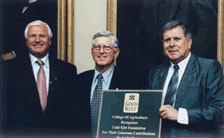Donation in Ag Alum's Honor Funds Facelift for Comer Conference Room
By: Jamie Creamer, Ag Illustrated Associate Editor

A CoAg alumnus' 18-year stint on the Gold Kist, Inc., Board of Directors has led to a major conference-room makeover in the College of Agriculture's Comer Hall.
The renovation of Room 109 in Comer was funded by a $30,000 donation from the Gold Kist Foundation to the College of Agriculture in honor of alumnus James E. "Jim" Brady, Jr., of Marion, Ala., who retired as vice chairman of the Gold Kist board last year. A ceremony was held recently to officially name the space the James Brady Conference Room.
New paint, carpeting and furniture and the addition of computer equipment, a motorized screen and a ceiling-mounted projector have transformed the stark, 1960s-era décor of the much-used 832-square-foot room into a professional, yet comfortable, 21st-century meeting environment. Interim Agriculture Dean John Jensen said the Gold Kist-supported renovation goes a long way toward enhancing the College's image.
"Auburn University is at the forefront of agricultural research and technology, and it was important that this conference room, which is the most visible room in Comer Hall, reflect that professional image," Jensen says.
Brady, a 1961 AU graduate with a degree in agronomy and soils, is a catfish, cattle and row-crop farmer in Marion who served as a director of Gold Kist, the nation's second largest chicken processor, from 1984 until 2002. When told by Gold Kist that the company wanted to recognize his outstanding service with a monetary donation in his honor, Brady wasted no time in designating his alma mater as the beneficiary. He visited with Jensen to discuss how the donation could best benefit the College.
"We talked about the College's need to project a professional image, and how important restoring Comer Hall to its grandeur of old is to that, and Jim said, 'Let's do it,'" Jensen recalls. "This is the first of what we hope will be many Comer renovations toward presenting the College as it should be presented."
The original Comer Hall was built in 1910 but was destroyed by fire 10 years later. The College of Agriculture moved into the rebuilt Comer Hall in 1922. In the 81 years since then, Comer has not undergone a major renovation, and it shows. Comer has no hot water, serious restroom deficiencies, no handicap accessibility and no fire escape save the center stairway.
"There is no question about the need for a complete overhaul of Comer Hall, if for nothing else than to bring the building in compliance with today's building codes," says Don Seay, Alabama Agricultural Experiment Station land and facilities manager.
Major renovation projects are subject to the availability of funds, however, and unfortunately, Comer is not the only building on AU's campus overdue for serious renovation, Seay says. Although Comer has been on the AU Facilities Division's "Renovation of Old and Historically Important Buildings" list for years, it currently ranks fifth on that list in terms of priority.
The Comer Hall renovation, which will modernize the building while maintaining the integrity of its architecture, is expected to cost about $7.6 million and tentatively is scheduled for the 2008-09 fiscal year, according to Facilities.
Meanwhile, should other funds become available through donations from alumni or supporters, renovations will be done on a "room-by-room" basis, says Kelley Terry, CoAg special projects coordinator.
To learn more about the renovation plans or to learn how you can help make that renovation happen, contact Terry at 334-844-3209.